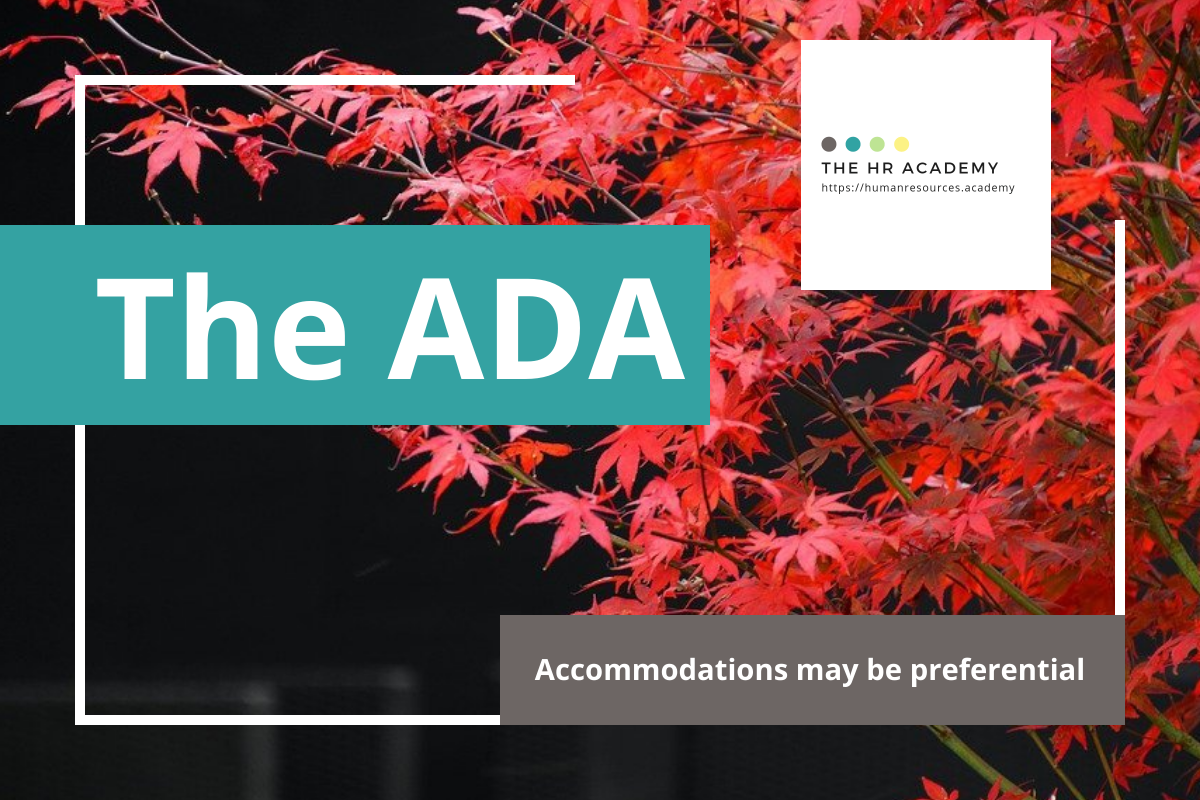Reasonable Accommodations may be Preferential

Reasonable-Accommodation-01
What Would You Do?
Q. How would you respond? An employee with a diagnosis of Bi-Polar Disorder works with Human Resources to request a flexible schedule for medication changes, including an exemption from night shifts and additional leave he would otherwise not be entitled to under the regular leave system. One of his co-workers complains to you that “it’s not fair” that the employee does not have to work the night shift and “gets more than his fair share” of leave.
Q. What would you do? You work in Human Resources. A supervisor in charge of 30 employees manages an on-call schedule in which each employee is required to be on-call 3-4 nights per month. An employee with a seizure disorder requests an exemption from on-call as a reasonable accommodation. She has supporting documentation from her treating physician, but the supervisor informs her that “I don’t make exceptions to the rule for anyone or any reason.”
Reasonable-Accommodation-01-PPTThe Case
In U.S. Airways, Inc. v. Barnett, the Supreme Court considered whether a reasonable accommodation of a job transfer under the Americans with Disabilities Act could overrule an employer’s seniority system. Id. at 394. In most cases, the Court ruled, the seniority system would prevail, because allowing an individual with a disability to take preference over others with seniority in an established system would not be “reasonable.” Id. Importantly, though, the Court elaborated its position on reasonable accommodations as preferential treatment. Id. at 397. Discussing whether the ADA sanctions such treatment, the Court noted that, “[t]he Act requires preferences in the form of ‘reasonable accommodations’ that are needed for those with disabilities to obtain the same workplace opportunities that those without disabilities automatically enjoy. By definition any special ‘accommodation’ requires the employer to treat an employee with a disability differently, i. e., preferentially.” Id. Thus, the Court established that reasonable accommodations are, by their very nature, often an exception to a rule, policy, or practice within the organization.
U.S. Airways, Inc. v. Barnett, 535 U.S. 391 (2002).
Employment Best Practices
“The law requires an employer to provide reasonable accommodation to an employee or job applicant with a disability, unless doing so would cause significant difficulty or expense for the employer (‘undue hardship’)”.
“A reasonable accommodation is any change in the work environment (or in the way things are usually done) to help a person with a disability apply for a job, perform the duties of a job, or enjoy the benefits and privileges of employment.”
“Reasonable accommodation might include, for example, making the workplace accessible for wheelchair users or providing a reader or interpreter for someone who is blind or hearing impaired.”
“While the federal anti- discrimination laws don’t require an employer to accommodate an employee because he or she must care for a family member with a disability, the Family and Medical Leave Act (FMLA) may require an employer to take such steps. The Department of Labor enforces the FMLA. For more information, call: 1-866-487- 9243.”
More available at EEOC.gov
The Bottom Line
Employers must provide reasonable accommodation to employees with disabilities unless doing so would cause undue hardship for the business. U.S. Airways dealt primarily with the conflict between a seniority system and a requested reasonable accommodation. Additionally, though, the Supreme Court clarified that, in many cases, an accommodation constitutes preferential treatment. Reasonable accommodations therefore may grant preference to individuals with disabilities, despite company policies, rules, or practices.
Disclaimer: Nothing in the HR Academy’s Expert Toolkits and online resources constitutes legal advice. Our informative resources provide Human Resources professionals with useful information related to federal employment law and recent court cases in a variety of jurisdictions. Always consult an attorney with employment law questions. Also note that not all cases in the Academy’s Expert Toolkits constitute mandatory authority in every jurisdiction. While Supreme Court cases are mandatory authority, circuit court decisions and U.S. District Court decisions relate to the specific jurisdiction in which the case was heard. The HR Academy does not provide legal advice, and our Expert Toolkits are provided solely as informational supplements for training and staff development.